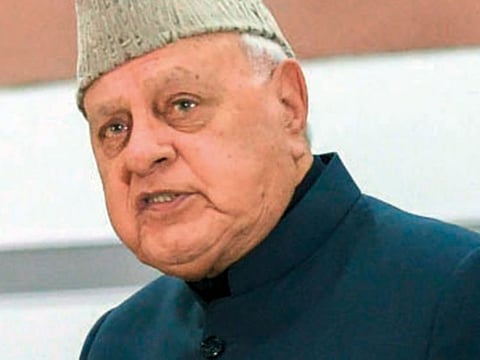India: Farooq Abdullah detained under Public Safety Act in Kashmir, can go sans trial for 2 years
The place where Abdullah senior will be housed has been declared a temporary jail

Srinagar: In a major development in Kashmir, former Chief Minister of Jammu and Kashmir Farooq Abdullah was on Monday detained under the Public Safety Act (PSA).
Not just that, the place where Abdullah senior will be housed has been declared a temporary jail, through an order.
The PSA allows detention of any individual for up to two years without a trial. Ironically, the law was first promulgated during Sheikh Abdullah's tenure, father of Faoor Abdullah.
Muneer Khan, a top police official, says "a committee will decide how long the arrest will be."
Farooq Abdullah, also a sitting Lok Sabha member from Srinagar has been under house arrest since August 5, when the Government of India abrogated Article 370 of the constitution that gave special powers to Kashmir.
Abdullah is the first pro-India politician who has been arrested under the Public Safety Act, under which rights activists say more than 20,000 Kashmiris have been detained in the last two decades.
Amnesty International has called the PSA a "lawless law," and rights groups say India has used the law to stifle dissent and circumvent the criminal justice system, undermining accountability, transparency, and respect for human rights.
Recently, National Conference MPs were allowed to visit Farooq and his son and also another former J&K Chief Minister Omar Abdullah, but with restrictions that they cannot interact with media following the meeting.
It was after Justice Sanjeev Kumar had allowed the petition filed by MPs Justice (retd.) Hasnain Masoodi (Anantnag) and Akbar Lone (Baramulla).
The Supreme Court on Monday also issued notice to the Centre, and the J&K administration on detention of the NC chief. The bench was responding to a plea by Rajya Sabha MP and MDMK general secretary Vaiko seeking production of Abdullah senior.
'I will myself visit Srinagar,' India Chief Justice
(PTI)
SC seeks report from J&K HC chief justice about people being unable to approach court
The Supreme Court on Monday sought a report from the Jammu and Kashmir High Court chief justice on allegations that people were finding it difficult to approach the high court.
Chief Justice of India Ranjan Gogoi said it is "very very serious" if people were unable to approach the high court. "I will myself visit Srinagar," he said.
A lawyer representing two child rights activists alleged in court that people were finding it difficult to approach the high court.
The CJI warned the lawyer that if the report of the high court chief justice indicates contrary, then get ready for "consequences".
SC asks Centre to restore normalcy in Kashmir
The Supreme Court on Monday asked the Centre to make all endeavours to restore normalcy in Kashmir as soon as possible.
A bench of Chief Justice Ranjan Gogoi and justices S A Bobde and S A Nazeer said as the so-called shutdown is in the valley itself, then it can be dealt by the Jammu and Kasmir High Court.
The bench was told by the Centre that all Kashmir-based newspapers were running and the government had been offering all kinds of assistance.
It also said that TV channels like Doordarshan and others private ones along with FM networks are working in the state.
The bench asked Attorney General K K Venugopal, appearing for the Centre, to put details of these steps taken on an affidavit.
Sign up for the Daily Briefing
Get the latest news and updates straight to your inbox






